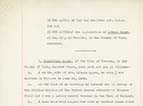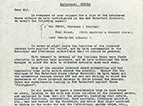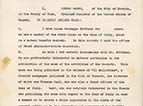Under the Law
As I observed in another case, the regulations with regard to internment were never intended to be used as punitive measures, but merely for the purpose of preventing disloyal persons from committing sabotage or acts of a subversive character. This is the real issue in this, as in all other cases, and each case must be judged on its own merits, taking into account all the surrounding circumstances.
JD Hyndman to Minister of Justice, February 13, 1941, Library and Archives Canada
You can’t exist without freedom of expression and call yourself a democracy. So, it’s central...What’s the extent of that freedom? It’s always trying to balance the kind of interests. What are the kind of interests in preserving, for example, peace and property interests, people that shouldn’t be arbitrarily destroyed, or causing harm or the possibility or probability of harm. These are tough questions that you have to balance. The point is, dissent and disagreement are essential to the, if you like, organic growth, not just of the law, but of a democracy. But the expression of that, and the means chosen for that dissent, cannot be in violation of the law of the land. And you’re constantly looking for that balance. And you certainly don’t want, in responding to a breach of the law of the land, there are other principles that have to be brought in. In other words, what’s the proportionate response?
Justice Frank Iacobucci, video interview, Columbus Centre Collection
The War Measures Act was first introduced by the government of Robert Borden during World War I. The Act gave the Dominion government unlimited powers to ensure that Canada was protected from any internal or external threats that might jeopardize its ability to successfully wage war. This included banning subversive political organizations and suspending foreign-language newspapers. The War Measures Act also allowed for the internment of Canadian residents born in countries or empires at war with Canada.
Over the course of World War I, a number of amendments were made to the War Measures Act. These amendments were later revised just prior to the outbreak of World War II and became known as the Defence of Canada Regulations (DOCR).
The DOCR was introduced in September 1939, prior to Canada’s formal declaration of war against Germany. Once Italy joined the war on the side of Germany, these regulations affected Italian Canadians. It was under the DOCR that the Minister of Justice had the ability to intern any individual suspected of acting “in any manner prejudicial to the public safety or the safety of the state.” Under this regulation, habeas corpus – the need to produce evidence against an internee – and the right to a fair trial were suspended.
The regulations also required certain Italian Canadians – regardless of whether they were Canadian-born or naturalized – to register with authorities and to report on a regular basis.



